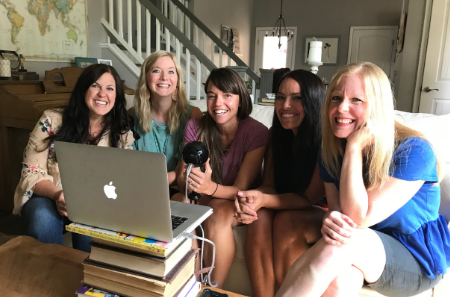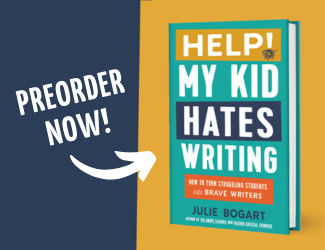Brave Writer Podcast: Routines, Chaos, and Big Goals—Oh My! with CO Springs Homeschool Mamas Group

Can you believe this is the final episode of the Ask Julie series?! I’ve read the feedback from everyone who’s written in, or left an Apples Podcast review, and I’m deeply touched to hear how this series has resonated with you—the listeners!
Let’s give a big round of applause for each guest! Their vulnerability and bravery has been such a gift to all of us!
Today’s episode is a unique format—a homeschooling group of friends asked to be interviewed together. Each interviewee came with her own quandary.

We tackled problems ranging from checklist anxiety and handwriting problems to homeschooling while personal life is in upheaval.
Tune in to find out:
- Why you only have to get it “mostly right” (in homeschool AND in life)
- How connection attracts and completes checklists
- Tips & tricks for managing your expectations
- How YOU are the catalyst for changing the learning environment in your home
Mandy Houle asks: What about pen and paper work for a young, exuberant extrovert?
Mandy’s seven-year-old son is energetic, friendly, and generous – but it’s a challenge getting him to sit down long enough to write.
A lot of us run into this issue as our children get to the point where we feel they’re “supposed” to be writing, but it’s important to remember that this is the very beginning of a young person’s writing life; it takes from ages 8 to 18 to become a fluent writer.
Julie’s advice:
- You could do Jot It Down! for another whole year, no handwriting on his part, and he’d still be fine.
- Give him writing incentives like different colored pens or a special notebook he can pick out.
- Go to tracing rather than writing. You write the sentence first and ask him to trace your words.
- You could jot down his stories and ideas, type them in a document, and print them out for him to trace.
- Get his whole body involved! Give him a sentence of copywork and ask him to use chalk to write as many of the words as he can on your driveway, or tape a huge piece of butcher paper on your wall and ask him to write big with his whole arm instead of having to use his tiny motor muscles.
Gigi Orsillo asks: What about when home school starts to feel like checking boxes off a list?
We tend to treat certain subjects (i.e. math) like vegetables and things like Poetry Teatime as dessert. We might keep pushing back the Nature Journaling and the movie discussions until we’ve “eaten our homeschool vegetables.”
So, what happens? You’re constantly in triage mode: you’re sitting in the ER, a child comes in, and you have to make a decision—what’s best for this child today, this week, this month?
The biggest problem with homeschool parents is that they want a rich learning environment, but they feel pressured to meet an abstract goal: grade level, progress, scope & sequence, or what another family is doing.
Homeschooling isn’t just getting through the book; it’s doing the detective work to help your child make progress you yourself can measure. In turn, you’ll feel more clarity and confidence. Our goal is to actually see our child developing.
Julie’s advice:
- Focus on Growth, not Grades. Focus on Observation, not Evaluation.
- Occasionally, clear out the day and give yourself permission to indulge in a rich experience and know that the routine will always be there when you’re ready to return to it.
- Write a Monthly Narrative Sketch (this is something we do in The Homeschool Alliance). Write down everything your child is learning, so you can look back and see measurable progress, improvement, and growth.
- Create a Scatterbook™: Buy a notebook, or pilfer one from the school supplies stockroom, or download an app – and begin today!
- Ask yourself every few days: Did I add to my Scatterbook™? Can I? Do I want to? Why don’t I want to? Then jot down your thought with a date.
- Freewrite a few times a month.
- Write down your goals: what do you hope your child will have accomplished by June of 2019? You can modify an end goal. If you don’t have an end goal it’ll be difficult in January to know if you’re anywhere near it.
- Collaborate with your child. You want them to have some skin in the game, so look at ways to make it an attractive goal.
Melissa Bolton asks: What about homeschooling with a newborn?
Melissa has a 2-month-old newborn at home, in addition to two other young children ages four and eight. That’s a big challenge for any parent, but especially a homeschooling parent.
But you can take solace in the fact that you don’t have to have an organized homeschool to learn. You can live in a semi-state of chaos and learning will still happen. In fact, you could put away all the workbooks and focus on 1:1 time reading/talking/interacting with an eight year old and they could still go up a grade level!
Plus, everything you’re trying to teach between ages 5-12 can be taught in one year of Jr. High. Before Jr. High, children don’t have the full set of mental tools—but those will come rushing in at Jr. High level.
Julie’s advice:
- Go Slow to Go Fast!
- Remember that homeschooling is at home, so there’s no end of the day bell. Use that to your advantage by utilizing nights and weekends or times that work best for you.
- Plan for 9 good minutes with your 8-year-old 1 to 3 times a day. The SCALE study shows that a child’s base ability for focused attention is their current age + 1 (i.e. an 8 year old’s focused attention span is 9 minutes). Age of child + 1 = number of minutes the child can devote to focused attention at any given time.
- Measure progress in other ways than workbook pages. Think of all the daily opportunities your kids have to learn that aren’t “traditional.”
- Don’t forget to take care of yourself! Remember you can’t pour from an empty cup. You are important.
Kelly Rollett asks: What about when one of your children (who happens to be very strong willed) wants everything to be their own idea, and has BIG ideas?
When a project is too messy, inconvenient, or too big: give your child part of it, whatever you can manage. Give him a piece of his big wish. Children don’t understand process, but you can offer opportunities for being adjacent to the idea.
The most important thing is to make sure you don’t just put it off. Curiosity is short-lived, and children express their curiosity in massive language (i.e. building a helicopter).
Julie’s advice:
- Give your child as much of what he wants that’s possible. So, if your child wants to build a helicopter: go to see helicopters, take a ride in one if you can, or buy a remote control helicopter or a model of one that he can build.
- Support his fantasy with language like, “That would be amazing if you could build helicopters—tell me about it! What would you do? How would you start?”
- Stop talking about what you want your child to do and just start doing! Wake up, make your cup of coffee or tea, and start the project. If your children want to join, they will.
- Nothing is more seductive than a parent doing a cool project alone and without announcing it.
- The promise of fun can be a turn off and they will want to prove you wrong.
- If you model a creative, engaged, excited-about-learning life in front of your child, then they will become curious.
- Big thinkers are amazing! So put a gigantic piece of butcher paper on the wall and ask your child to show you ALL the big ideas they have in their mind right now. You can say, “I want to make sure I know so that I can help you achieve those ideas!”
Julie Johnson asks: What about handling the demands of learning challenges and necessary one-on-one sessions while cultivating a connected homeschool?
Julie has four children under the age of 10, and she’s taken on big challenges: adoption, preemies, and home educating.
So, before we get to the advice, there’s something really important to emphasize for anyone in a similar situation: There are no educational emergencies! Learning will take the time it takes. Even if it takes six or seven years of elementary school, they’re still going to be okay.
Homeschooling is never “done.” You never get it right; it’s a constant process with evolving needs of people growing over time. A system never rescues you because something will inevitably derail your best plans.
Keep re-engaging around the principles of learning, whether it’s a deep dive or short term goals, and give yourself permission to learn which strategy is right for each child in their current season of life. Meet them where they are.
Julie’s advice:
- A struggling child might notice they’re struggling while others aren’t. So, we want to introduce our kids to why struggle is a part of this reading process.
- In a five-day week, you could have four days of intensity and one day of nothing. You let your hair down on that one day—no academic value to worry about. Instead, build the bonds within your beautiful family! Strengthen your relationship with yourself as well.
- Remember, again, that there are no educational emergencies. It takes the time it takes. When you feel drained, you have permission to take a break. All of us want to be the best home educators we can be — taking breaks or slowing down will not derail your progress.
- Be your kids’ cheerleader and give genuine 1:1 time as much as you can.
- When you take breaks, make sure you’re taking meaningful breaks—sometimes you need a whole week to refill and energize yourself and your homeschooling!
- Often times, there’s too big a step between Jot It Down! and Partnership Writing. Break writing tasks down into small mid-steps: Hand write words for them that they can then trace. Start with 1 word at a time each day—take a whole week on a 5-word sentence. Ask your child to say a sentence. Then at a later time dictate it back so he/she is writing their own words but doesn’t realize until they hear you dictate a certain word. Have your child write the first word of a sentence and you write the rest.
Download the FREE Podcast Transcript
Tags: Ask Julie


















